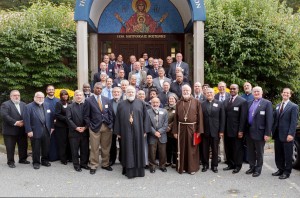Thanks to Metropolitan Methodios for taking the lead on this issue for the Orthodox in Massachusetts. This is a serious issue and I am very pleased to see that he called this meeting of religious leaders to discuss this issue.
On October 9, 2012 Metropolitan Methodios hosted Boston area religious leaders at the Metropolis to discuss the issue of Physician Assisted Suicide. Below are his opening remarks.
I am deeply grateful to all of you who took the time from your very busy schedules to come today to discuss an issue of great importance.
I note the great diversity of brethren who are here, not only from the Christian community but from the greater Ecumenical community including members of the Islamic community. Our Jewish brethren are not here because they are celebrating a High Holy Day.
I indeed hope that our meeting today will lead to collaboration and cooperation on other issues in the future. A special word of thanks to Fr. David Michael and Vito Nicastro for organizing today’s meeting.
Todays’ discussion will revolve around question two on the Massachusetts ballot next month—specifically legislation concerning physician assisted suicide. Patients diagnosed with a terminal illness and given a prognosis of less than 6 months to live would have the ability to request a lethal injection to end their lives.
For centuries now, all doctors take the Hippocratic Oath promising to practice medicine ethically and honestly, never doing harm to a patient. This proposed law would be impossible to control, and would have serious societal ramifications.
The Orthodox church believes that to elevate euthanasia to a right or an obligation would bring it into direct conflict with the fundamental ethical affirmation that as human beings we are custodians of life which comes from a source other than ourselves. Furthermore, the immense possibilities, not only for error but also for decision making based on self-serving ends which may disregard the fundamental principle of the sanctity of human life, argue against euthanasia.
Generally speaking, the Orthodox Church teaches that it is the duty of both physician and family to make the patient as comfortable as possible and to provide the opportunity for the exercise of patience, courage, repentance and prayer. The church has always rejected inflicted and unnecessary voluntary suffering and pain as immoral; but at the same time, the Church also has perceived in suffering a positive value that often goes unrecognized in the logic of the world in which we live, a world characterized by secularism, materialism, and individualism.
Euthanasia is a Greek word meaning “a good death”. The only “euthanasia” recognized in Orthodox ethics is that death in which the human person accepts the end of his or her life in the spirit of moral and spiritual purity, in hope and trust in God, and as a member of His kingdom.
Presently we will hear a presentation on the moral and ethical issues revolving around physician assisted suicide, then a word from George Kronin on the campaign against question two on the ballot, and then we want to hear and exchange views from everyone present and Cardinal O’Malley will give closing remarks.
The Orthodox church joins our brethren in the Ecumenical community, the American Medical Association, the Mass Medical Society and all people of good will in opposing question two on election day.
I have the pleasure of inviting to the podium Dr. Peter Cataldo who is the bioethicist for the Archdiocese of Boston.
(Photos by Gregory L. Tracy, The Pilot)


